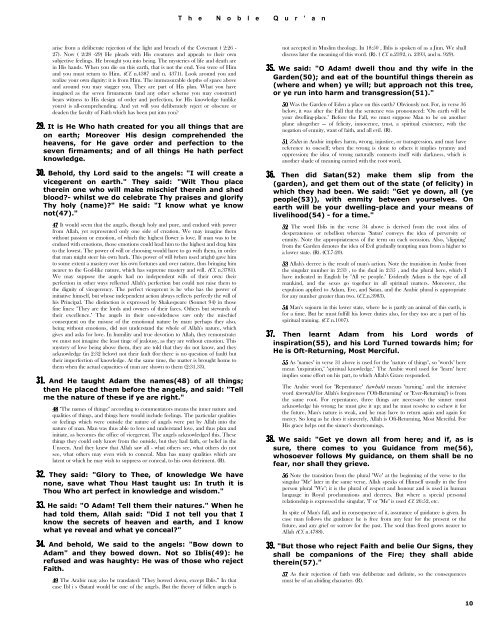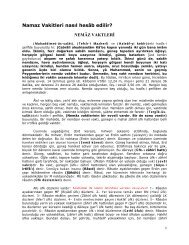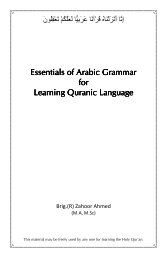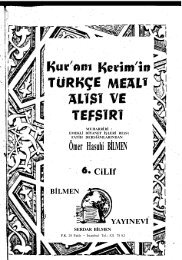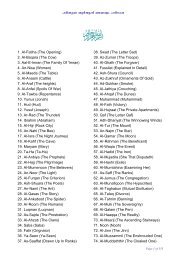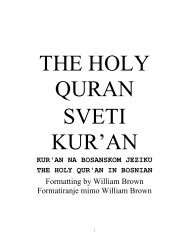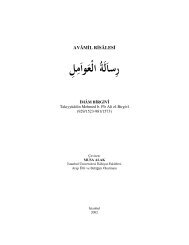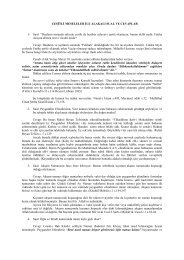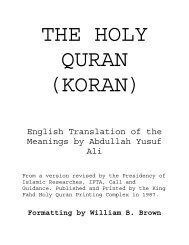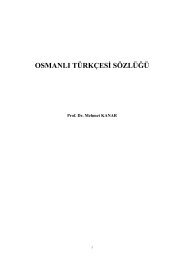English Quran with Commentaries By Yusuf-ali - HolyBooks.com
English Quran with Commentaries By Yusuf-ali - HolyBooks.com
English Quran with Commentaries By Yusuf-ali - HolyBooks.com
- No tags were found...
You also want an ePaper? Increase the reach of your titles
YUMPU automatically turns print PDFs into web optimized ePapers that Google loves.
T h e N o b l e Q u r ’ a n<br />
arise from a deliberate rejection of the light and breach of the Covenant ( 2:26 -<br />
27). Now ( 2:28 -29) He pleads <strong>with</strong> His creatures and appeals to their own<br />
subjective feelings. He brought you into being. The mysteries of life and death are<br />
in His hands. When you die on this earth, that is not the end. You were of Him<br />
and you must return to Him. (Cf. n.4387 and n. 4371). Look around you and<br />
re<strong>ali</strong>ze your own dignity: it is from Him. The immeasurable depths of space above<br />
and around you may stagger you. They are part of His plan. What you have<br />
imagined as the seven firmaments (and any other scheme you may construct)<br />
bears witness to His design of order and perfection, for His knowledge (unlike<br />
yours) is all-<strong>com</strong>prehending. And yet will you deliberately reject or obscure or<br />
deaden the faculty of Faith which has been put into you?<br />
29. It is He Who hath created for you all things that are<br />
on earth; Moreover His design <strong>com</strong>prehended the<br />
heavens, for He gave order and perfection to the<br />
seven firmaments; and of all things He hath perfect<br />
knowledge.<br />
30. Behold, thy Lord said to the angels: "I will create a<br />
vicegerent on earth." They said: "Wilt Thou place<br />
therein one who will make mischief therein and shed<br />
blood?- whilst we do celebrate Thy praises and glorify<br />
Thy holy (name)?" He said: "I know what ye know<br />
not(47)."<br />
47 It would seem that the angels, though holy and pure, and endued <strong>with</strong> power<br />
from Allah, yet represented only one side of creation. We may imagine them<br />
<strong>with</strong>out passion or emotion, of which the highest flower is love. If man was to be<br />
endued <strong>with</strong> emotions, those emotions could lead him to the highest and drag him<br />
to the lowest. The power of will or choosing would have to go <strong>with</strong> them, in order<br />
that man might steer his own bark. This power of will (when used aright) gave him<br />
to some extent a mastery over his own fortunes and over nature, thus bringing him<br />
nearer to the God-like nature, which has supreme mastery and will. (Cf. n.3781).<br />
We may suppose the angels had no independent wills of their own: their<br />
perfection in other ways reflected Allah's perfection but could not raise them to<br />
the dignity of vicegerency. The perfect vicegerent is he who has the power of<br />
initiative himself, but whose independent action always reflects perfectly the will of<br />
his Principal. The distinction is expressed by Shakespeare (Sonnet 94) in those<br />
fine lines: "They are the lords and owners of their faces. Others but stewards of<br />
their excellence." The angels in their one-sidedness saw only the mischief<br />
consequent on the misuse of the emotional nature by man: perhaps they also,<br />
being <strong>with</strong>out emotions, did not understand the whole of Allah's nature, which<br />
gives and asks for love. In humility and true devotion to Allah, they remonstrate:<br />
we must not imagine the least tinge of jealousy, as they are <strong>with</strong>out emotion. This<br />
mystery of love being above them, they are told that they do not know, and they<br />
acknowledge (in 2:32 below) not their fault (for there is no question of fault) but<br />
their imperfection of knowledge. At the same time, the matter is brought home to<br />
them when the actual capacities of man are shown to them (2:31.33).<br />
31. And He taught Adam the names(48) of all things;<br />
then He placed them before the angels, and said: "Tell<br />
me the nature of these if ye are right."<br />
48 "The names of things:" according to <strong>com</strong>mentators means the inner nature and<br />
qu<strong>ali</strong>ties of things, and things here would include feelings. The particular qu<strong>ali</strong>ties<br />
or feelings which were outside the nature of angels were put by Allah into the<br />
nature of man. Man was thus able to love and understand love, and thus plan and<br />
initiate, as be<strong>com</strong>es the office of vicegerent. The angels acknowledged this. These<br />
things they could only know from the outside, but they had faith, or belief in the<br />
Unseen. And they knew that Allah saw all - what others see, what others do not<br />
see, what others may even wish to conceal. Man has many qu<strong>ali</strong>ties which are<br />
latent or which he may wish to suppress or conceal, to his own detriment. (R).<br />
32. They said: "Glory to Thee, of knowledge We have<br />
none, save what Thou Hast taught us: In truth it is<br />
Thou Who art perfect in knowledge and wisdom."<br />
33. He said: "O Adam! Tell them their natures." When he<br />
had told them, Allah said: "Did I not tell you that I<br />
know the secrets of heaven and earth, and I know<br />
what ye reveal and what ye conceal?"<br />
34. And behold, We said to the angels: "Bow down to<br />
Adam" and they bowed down. Not so Iblis(49): he<br />
refused and was haughty: He was of those who reject<br />
Faith.<br />
49 The Arabic may also be translated: "They bowed down, except Iblis.” In that<br />
case Ibl i s (Satan) would be one of the angels. But the theory of fallen angels is<br />
not accepted in Muslim theology. In 18:50 , Iblis is spoken of as a Jinn. We shall<br />
discuss later the meaning of this word. (R). ( Cf. n.2392, n. 2393, and n. 929).<br />
35. We said: "O Adam! dwell thou and thy wife in the<br />
Garden(50); and eat of the bountiful things therein as<br />
(where and when) ye will; but approach not this tree,<br />
or ye run into harm and transgression(51)."<br />
50 Was the Garden of Eden a place on this earth? Obviously not. For, in verse 36<br />
below, it was after the Fall that the sentence was pronounced: "On earth will be<br />
your dwelling-place." Before the Fall, we must suppose Man to be on another<br />
plane altogether — of felicity, innocence, trust, a spiritual existence, <strong>with</strong> the<br />
negation of enmity, want of faith, and all evil. (R).<br />
51 Zulm in Arabic implies harm, wrong, injustice, or transgression, and may have<br />
reference to oneself; when the wrong is done to others it implies tyranny and<br />
oppression; the idea of wrong naturally connects itself <strong>with</strong> darkness, which is<br />
another shade of meaning carried <strong>with</strong> the root word.<br />
36. Then did Satan(52) make them slip from the<br />
(garden), and get them out of the state (of felicity) in<br />
which they had been. We said: "Get ye down, all (ye<br />
people(53)), <strong>with</strong> enmity between yourselves. On<br />
earth will be your dwelling-place and your means of<br />
livelihood(54) - for a time."<br />
52 The word Iblis in the verse 34 above is derived from the root idea of<br />
desperateness or rebellion whereas "Satan" conveys the idea of perversity or<br />
enmity. Note the appropriateness of the term on each occasion. Also, "slipping"<br />
from the Garden denotes the idea of Evil gradually tempting man from a higher to<br />
a lower state. (R). (Cf.7:20).<br />
53 Allah's decree is the result of man's action. Note the transition in Arabic from<br />
the singular number in 2:33 , to the dual in 2:35 , and the plural here, which I<br />
have indicated in <strong>English</strong> by "All ye people." Evidently Adam is the type of all<br />
mankind, and the sexes go together in all spiritual matters. Moreover, the<br />
expulsion applied to Adam, Eve, and Satan, and the Arabic plural is appropriate<br />
for any number greater than two. (Cf .n.3983).<br />
54 Man's sojourn in this lower state, where he is partly an animal of this earth, is<br />
for a time. But he must fulfill his lower duties also, for they too are a part of his<br />
spiritual training. (Cf. n.1007).<br />
37. Then learnt Adam from his Lord words of<br />
inspiration(55), and his Lord Turned towards him; for<br />
He is Oft-Returning, Most Merciful.<br />
55 As "names" in verse 31 above is used for the "nature of things", so "words" here<br />
mean "inspiration," "spiritual knowledge." The Arabic word used for "learn" here<br />
implies some effort on his part, to which Allah's Grace responded.<br />
The Arabic word for "Repentance" (tawbah) means "turning," and the intensive<br />
word (tawwab} for Allah's forgiveness ("Oft-Returning" or "Ever-Returning") is from<br />
the same root. For repentance, three things are necessary: the sinner must<br />
acknowledge his wrong; he must give it up; and he must resolve to eschew it for<br />
the future, Man's nature is weak, and he may have to return again and again for<br />
mercy. So long as he does it sincerely, Allah is Oft-Returning, Most Merciful. For<br />
His grace helps out the sinner's short<strong>com</strong>ings.<br />
38. We said: "Get ye down all from here; and if, as is<br />
sure, there <strong>com</strong>es to you Guidance from me(56),<br />
whosoever follows My guidance, on them shall be no<br />
fear, nor shall they grieve.<br />
56 Note the transition from the plural "We" at the beginning of the verse to the<br />
singular "Me" later in the same verse, Allah speaks of Himself usually in the first<br />
person plural "We"; it is the plural of respect and honour and is used in human<br />
language in Royal proclamations and decrees. But where a special personal<br />
relationship is expressed the singular, "I" or "Me" is used Cf. 26:52, etc.<br />
In spite of Man's fall, and in consequence of it, assurance of guidance is given. In<br />
case man follows the guidance he is free from any fear for the present or the<br />
future, and any grief or sorrow for the past. The soul thus freed grows nearer to<br />
Allah (Cf. n.4788).<br />
39. "But those who reject Faith and belie Our Signs, they<br />
shall be <strong>com</strong>panions of the Fire; they shall abide<br />
therein(57)."<br />
57 As their rejection of faith was deliberate and definite, so the consequences<br />
must be of an abiding character. (R).<br />
10


